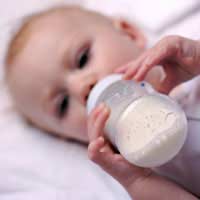Expressing Milk and Breast Pumps

Many women favour breastfeeding because they view it as the most natural option. However, women can not automatically turn the process of lactation on and off, so there is always a risk that a woman will produce more milk than her baby can consume. Whether a mother is simply going to be away from her child for a little while or is attempting to wean her baby from the breast, she can not specifically calculate how much milk she would like to produce. When a mother produces more milk than is needed, her own health and well being can be put in jeopardy. To avoid an unnecessary build up of breast milk, women can express their milk by hand or by using a breast pump.
Dangers of Excess Milk
A build up of breast milk rarely affects a mother's health to the degree that it becomes life threatening, but it certainly can make the breasts hard and sore. Some mothers may find that their milk production leads to engorgement then even plugged ducts if their milk begins to back up in the breast. If the milk leaks into other breast tissues then there may be a risk of infection or abscess. To avoid these problems women who produce more milk than they need must find another way to get the milk out of the breast. Expressing milk by hand and using breast pumps are two common ways of draining the breast of excess milk. However, if a milk back up has begun then women who experience pain, see redness, feel heat or notice lumps in their breasts should consult a medical professional immediately.Expressing Milk By Hand
Expressing milk by hand means squeezing milk from the breasts. Many nursing mothers do this in order to stimulate milk flow or to relieve pressure in the breast. For women who only express milk occasionally, expressing by hand makes sense as there is no need to invest in other equipment. Women who want to express milk by hand should wash their hands thoroughly, place the thumb and fingers around the areola and squeeze in a circular motion while pressing back against the chest wall. Many women think of expressing milk by hand as akin to milking a cow, however this idea should not keep a woman from expressing her milk. Expressing milk by hand should not hurt, so women who find it painful may want to experiment with different levels of pressure and pressing.Breast Pumps
For women who want to express milk frequently or express enough milk to fill bottles for their babies, breast pumps may be the most efficient means of doing this. Breast pumps can be electrical or manual and usually function as a suction cup on the breast which extracts milk from the nipple. Using a breast pump to express milk from both breasts usually takes about a half hour. There are many different kinds of breast pumps on the market, so finding one that fits your needs is important. Midwives, lactation consultants and experienced breastfeeders are usually able to offer information about particular models.When a baby has been fed and is enjoying proper nutrition, many women still find that they are producing more milk than they need. Expressing milk by hand or via breast pumps is a common way for women to make use of excess breast milk while at the same time avoiding health problems such as engorgement. Midwives, GPs and lactation consultants can all offer more information on expressing milk.
- Establishing a Breastfeeding Routine
- Getting Help for Breastfeeding
- Weaning a Child Away from Breastfeeding
- Breastfeeding and Mother's Nutrition
- How to Tell If a Baby Is Getting Enough Milk
- Common Problems for Breastfeeding Mums
- Breastfeeding and "Latching On"
- Breastfeeding and Breast Reduction
- Breastfeeding in Public Places
- Breastfeeding Advice and After Breast Implants
- Is Breast Feeding the Best Way?
- Breastfeeding Glossary
- Deciding to Breastfeed for the Right Reasons


Re: Breasts and Sun Protection
I laid out topless for the first time in my life, and will never do it again! I stayed out rotating and basting for a hour before I…
Re: Breasts and Wrinkles
Hi, i stopped breastfeeding last year and i have been using over counter pills for quick drying up. now my breast are flat and wrinkled.…
Re: Breasts and Wrinkles
One of my breast grew a lot during pregnancy. The same got engorged post delivery. One i got relieved from engorgement, this brest has sagged…
Re: Breasts and Sun Protection
@Bec - it will go - just be careful in the future. This is such a sensitive area of the body you have to be careful.
Re: Breasts and Wrinkles
My breasts are starting to gather wrinkles on the top and I would appreciate some advice on creams or something I can do to prevent this from…
Re: Breast Tattoos
Am getting my first tattoo, and I'm getting it on my left Breast. The tattoo will be a Rose, as it's my favourite flower. Anyone got any advice for…
Re: Skin Creams for Breasts
I have a proble my breast makes me uncomfortable when it comes to undress myself ever since i breastfeed.so i don't know what to do…
Re: Breasts and Wrinkles
Hi there, i've just started breatfeeding 18 days ago. Ive noticed a dry, scaly, wrinkly patch of skin on my boob. It's not itchy or painful.…
Re: Treating Breast Acne
My wife has got a big and hard pimple on her breast.The pimple doesn't get the mouth so pus will come out. To which doctor I'll go and how…
Re: Benefits of Breast Reduction
@rashmi - I'm afraid we can't recommend specific specialists, so you would have to do an online search for breast reduction…